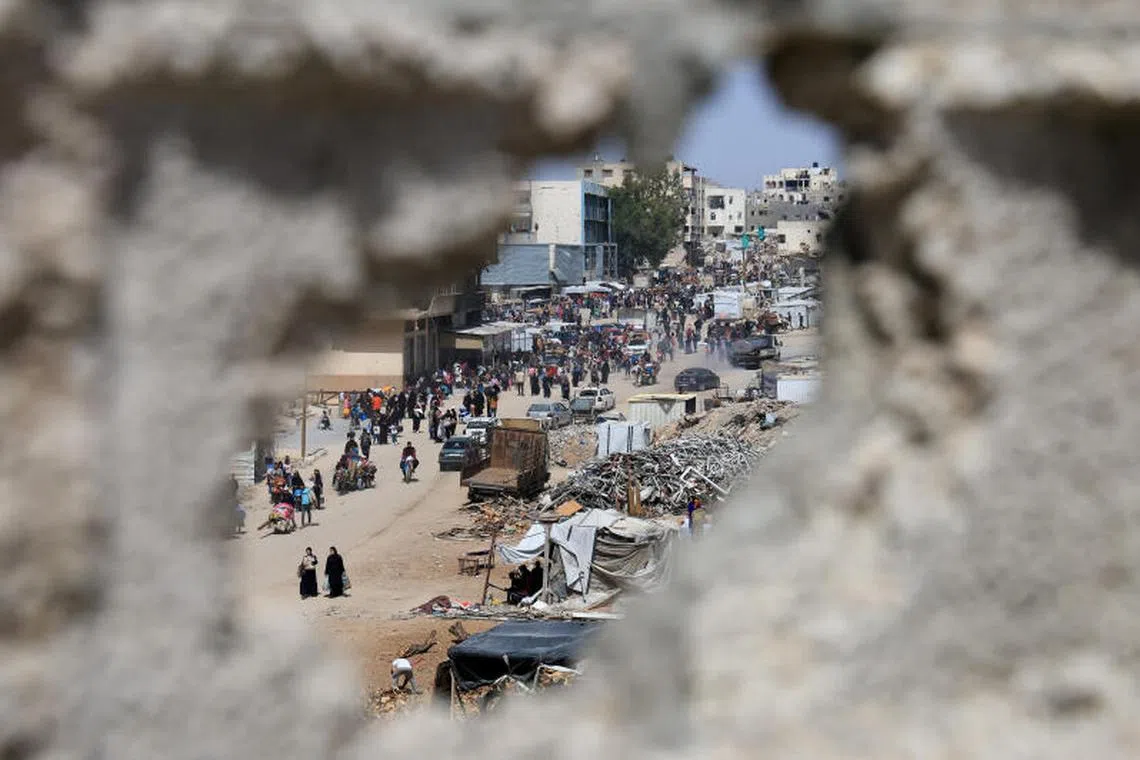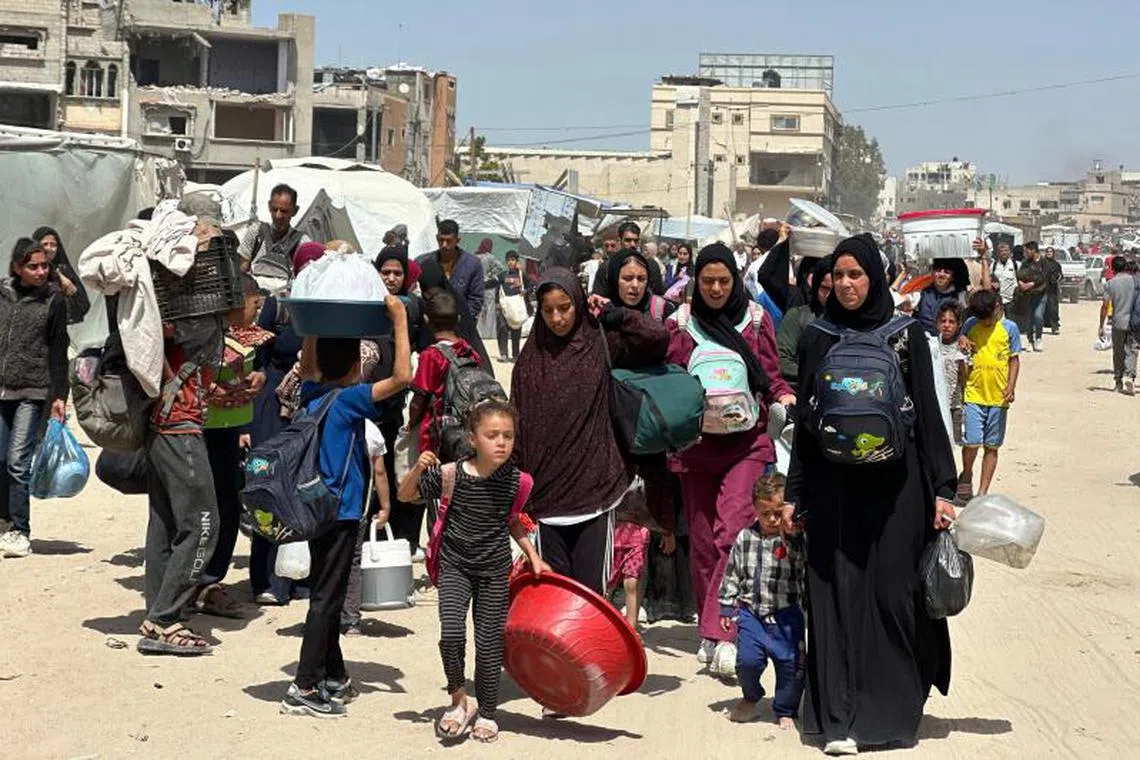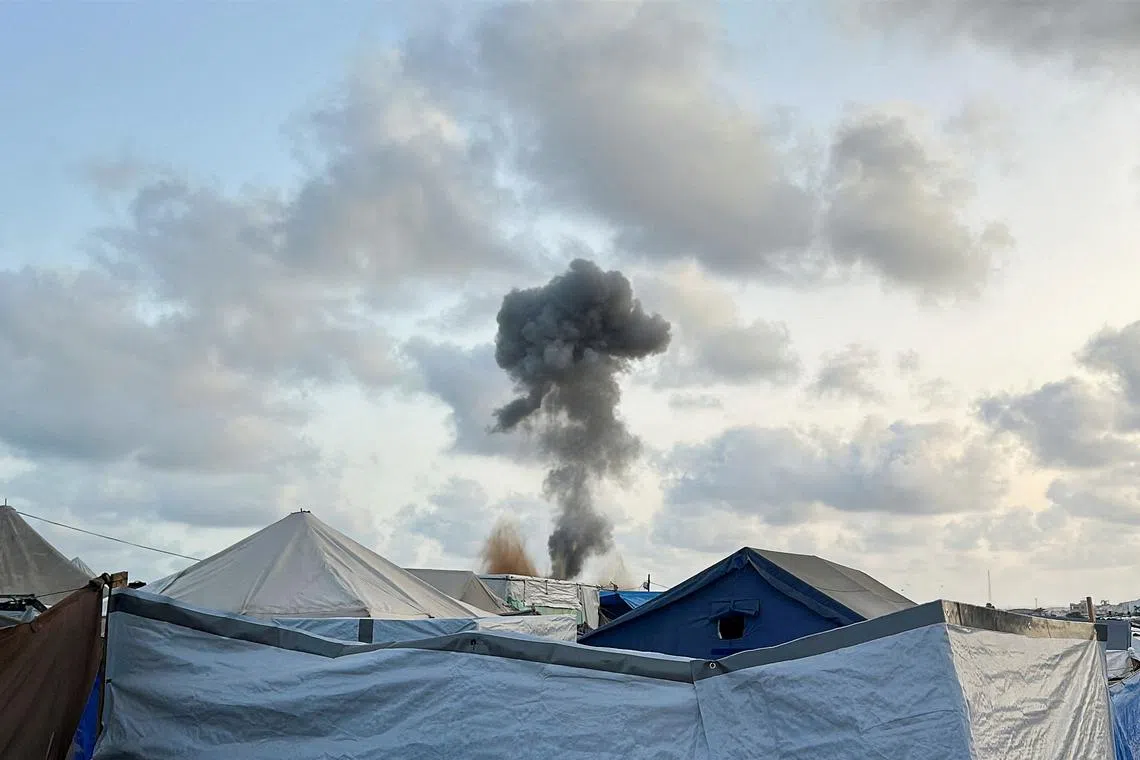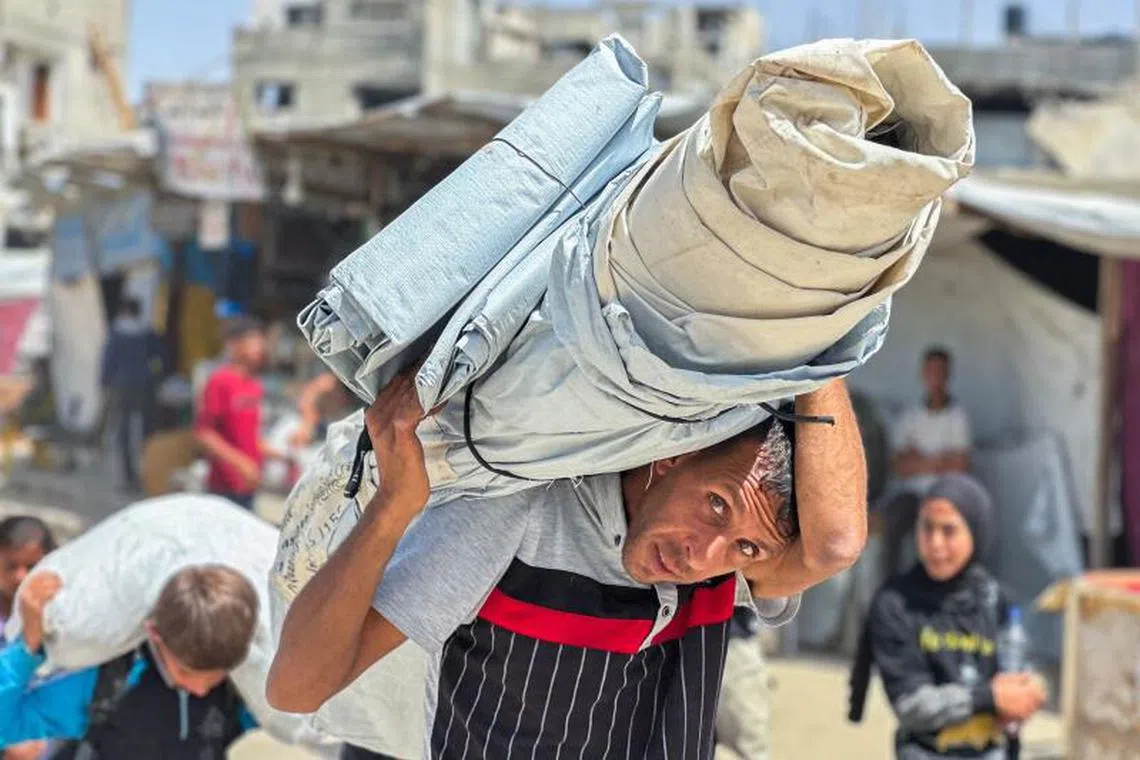Trump plan or not, Israel is letting more Palestinians leave Gaza
Sign up now: Get ST's newsletters delivered to your inbox

Palestinians fleeing homes in Khan Younis, Gaza, after the Israeli military issued evacuation orders.
PHOTO: REUTERS
CAIRO/RAMALLAH/ISRAEL-GAZA BORDER – For more than a year, Israeli authorities prevented Dr Ayed Ayoub from escaping Gaza’s hunger and war with his family for an academic fellowship in France. He finally left in April, after Israel unexpectedly eased its tight control of the border.
Dr Ayoub, his wife and their four children are among around 1,000 Palestinians who have left Gaza following Israel’s relaxation of rules in recent months, bussed from the enclave to board flights to Europe and elsewhere, according to interviews with affected Gazans and foreign diplomats.
“The situation in Gaza has become unbearable,” said 57-year-old Dr Ayoub, an engineer who earned his doctorate and master’s degree at a French university after moving there in the early 2000s. His return was as part of a group of 115 Gazans accepted by France in April.
The new departures require a request to Israel by a foreign government, and their numbers remain relatively small.
Reuters could not establish why Israel was now letting more Palestinians leave Gaza, which comes amid an international outcry over the humanitarian conditions there. However, the easing of restrictions parallels the Israeli government’s stated goal of facilitating the resettlement of Gaza’s population in other countries.
For Israeli Prime Minister Benjamin Netanyahu, talk of mass resettlement of Palestinians from Gaza has helped shore up support with far-right allies who oppose a further truce with Hamas and want to re-establish Jewish settlements there.
Interior Minister Moshe Arbel has described the recent departure of Gazans to European countries as a bid to temporarily and voluntarily vacate the Gaza Strip
The US President has proposed developing the enclave as a coastal resort
“I thank President Trump for thinking of this important initiative,” Mr Arbel said on April 1, after supervising the departure of a flight taking Gazans to Germany. “Together, joining forces, we will turn this place into a paradise. With God’s help, let us succeed.”
His spokesperson did not respond to a request for comment. After the evacuation that Dr Ayoub’s family were part of, the French Foreign Ministry said France remained opposed to the forced displacement of people from Gaza. United Nations Secretary-General Antonio Guterres has warned that the Trump idea could amount to ethnic cleansing.
Despite the comments from Mr Arbel, five Israeli officials told Reuters the easing of restrictions was not a direct response to Mr Trump’s Gaza proposal or part of any such plan. One of the Israeli officials said Israel was not trying to reduce Gaza’s population, but rather responding to mounting requests by countries seeking to help people reach a safe destination.
For many Palestinians, the opportunity to move is fraught with echoes of historical dispossession of their lands. Dr Ayoub and others among those who recently left told Reuters their departure was only temporary. However, nearly half of Gazans would now consider leaving
Policies in place since Israel broke a fragile six-week ceasefire on March 2 further increased pressure on Gaza’s population, even as US and Arab mediators push for an end to the war.

Palestinians moving with their belongings following Israeli evacuation orders for Khan Younis on May 19.
PHOTO: AFP
Famine risks have worsened under Israel’s two-month blockade of all aid deliveries in Gaza. It renewed a bombing campaign, killing 464 people last week, according to Gaza’s Health Ministry. And it launched a new “extensive” land offensive on May 18, two days after Mr Trump concluded a tour of Gulf states.
Israel also said on May 18 it would ease the blockade and allow in limited aid
Mr Netanyahu has hailed Mr Trump’s idea for Gaza but cites a major obstacle: “We have one problem – we need receiving states,” he told a hawkish group of Gaza war veterans on May 20. Neighbours Jordan and Syria – which have large Palestinian refugee populations dating back decades – and Egypt are loath to take in large numbers of Gazans.
For this story, Reuters spoke with five Gazans who left recently, along with nine foreign diplomats and seven Israeli officials, to establish details of the impact of the new rules around exits from Gaza.
The foreign diplomats said Israel began informing foreign governments in late 2024, before Mr Trump took office and floated his proposal, that they would soon ease the restrictions. The diplomats asked to remain anonymous because they were not authorised to speak to the media.
The relaxed restrictions largely took effect at the start of 2025. Israeli officials now take days instead of weeks or months to approve requests for Palestinians with foreign citizenship and their relatives, as well as recipients of foreign scholarships, the diplomats involved said. Among those now allowed to leave were Palestinians previously denied exit by Israel on security grounds, they added.

Smoke rising from a site hit by Israeli strikes, as seen from a tent camp sheltering displaced Palestinians in Khan Younis on May 19.
PHOTO: REUTERS
The Israeli Prime Minister’s office, Defence Ministry and its Cogat branch which coordinates with the Palestinians did not respond to queries about the scope or reason for the recent easing of restrictions. Hamas, which has urged Gazans not to take part in any relocation offers, said it was looking into reports of restrictions being eased.
Gaza
The population of Gaza has already fallen by about 160,000 over the course of the war to around 2.1 million, according to the Palestinian statistics agency. More than 53,000 residents have been killed, and the rest have left, including some allowed out for medical emergencies. Others have been able to leave through an expensive system involving Egyptian brokers.
Thousands of foreign nationals fled earlier in the war, but it became much harder to get permission once Israel took over the Rafah crossing with Egypt in May 2024 and enforced a near-total closure of Gaza’s borders.
In March 2025, Israel’s government established a new agency that would help Gazans who want to resettle in third countries. Reuters was unable to establish whether the department is functioning.
Reuters could not establish exactly how many people had been able to leave under the new criteria. Three diplomats estimated at least a thousand, while several said they could be sure only of their own citizens, citing numbers in the high hundreds.
Israeli authorities did not respond to a question about numbers.

Palestinians moving with their belongings after Israeli evacuation orders for Khan Younis on May 19.
PHOTO: AFP
Over a dozen, primarily European, countries have now been able to get people out from Gaza, with most exits occurring since March, all the diplomats said.
Gisha, an Israeli human rights group that advocates for freedom of movement for Palestinians, said Israel’s easing of restrictions was “partial, inconsistent and non-transparent”, arguing that many more people should be allowed to leave.
“What may appear to be ‘concessions’ are, in fact, selective and limited responses to international pressure and legal action,” Gisha spokeswoman Shai Grunberg told Reuters.
The organisation estimates thousands of Palestinians still in Gaza hold foreign citizenship, residency, student visas or eligibility for entry into a third country through family reunification visas or similar programmes.
‘We will come back’
Only a fraction of Gazans meet the present Israeli criteria for being allowed out. For those who do, the choice is not easy.
Many fear leaving their land would result in another “Nakba”, or catastrophe
“We will come back to Gaza once the conditions allow, as soon as we can,” said poet Dunia Al-Amal Ismail, a 53-year-old widow who made it out as part of the same group as Dr Ayoub, with her 21-year-old daughter and 18-year-old son.
Ms Ismail secured a place in the same French academic programme that helps researchers, artists and their families get out of conflict zones.
Those leaving face a perilous journey through the enclave, which is scattered with unexploded rockets and shells. Palestinians are gathered by vehicles before dawn and driven to an Israeli-run border crossing, where they undergo Israeli security checks before being processed by foreign diplomats, the people Reuters spoke to said.
Israel allows those leaving to bring only one small bag each. They travel in buses under Israeli military escort to the Jordan border, four diplomats said.
Aware of severe food scarcity, the diplomats said they bring sandwiches and drinks for those leaving Gaza.
One diplomat said a Palestinian man, eating a chicken sandwich, had commented that he had forgotten the taste of meat.
An academic among the group that recently arrived in France described meeting the diplomats in the desert.
“All of a sudden, a fridge appears from nowhere, and you see everything you have been deprived of for many months,” he told Reuters. “I ate, but with pain in my chest for the people who we left behind.”
Several of the Palestinians Reuters spoke to declined to be identified for fear of retribution from Hamas and other armed groups.
Travel documents present logistical challenges, several of the diplomats said. Some papers have been lost in the war, while others are needed for children born since it began. Some must have travel documents issued by the Palestinian Authority in Ramallah or Cairo, they said.
From Jordan, they board flights to the countries that helped them leave, though there have been some flights from Israel, according to the diplomats, flight data and Israel’s Interior Ministry.
For Dr Ayoub, painful memories weigh heavily.
One of his sisters, her husband and their son were killed in bombardments at the start of the war, which was triggered by the Hamas-led attack on southern Israeli communities on Oct 7, 2023, in which about 1,200 people were killed and 251 were taken as hostages to Gaza.
Dr Ayoub’s nephew, an architect, had also recently won a fellowship in France but never made it out. He died on May 15 from injuries he sustained in an air strike. The French programme backing the fellowship issued a statement mourning his death.
Dr Ayoub was conflicted about leaving: relieved to secure a better future for his children but at the same time distraught “because I left my sister and her children, and many people who are dear to me”, he said, referring to another of his siblings.
“One moment I’m happy, and the next I remember what’s happening in Gaza,” he said. REUTERS


